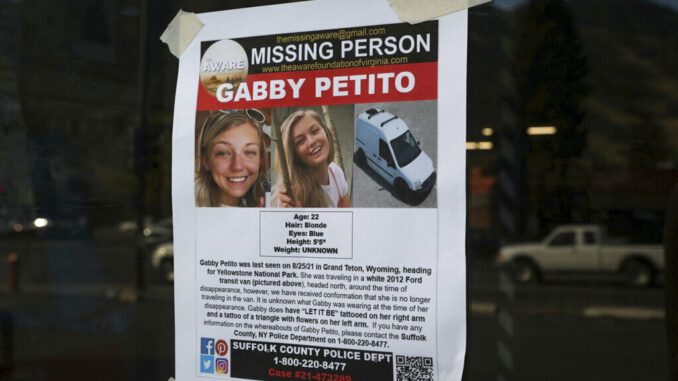
In the midst of the Gabby Petito missing-persons case that has gotten a lot of national media coverage over the last couple of weeks, some reporters,  anchors and others in the media have raised the issue of whether or not the mainstream press gives more attention to missing white women cases than they do in the cases of missing people of other races.
anchors and others in the media have raised the issue of whether or not the mainstream press gives more attention to missing white women cases than they do in the cases of missing people of other races.
MSNBC host Joy Reid, who normally is seen spouting off insane conspiracy theories and wacko rants on her program, actually had a decent segment last week discussing the Petito case and the term “Missing White Woman Syndrome,” a term she said was coined by the late PBS NewsHour anchor Gwen Ifill who, like Reid, is black.
The term, Reid said, is used “to describe the media and public fascination with missing white women, like Laci Peterson or Natalee Holloway, while ignoring cases involving missing people of color.”
It would probably surprise Reid to hear this, but few people — including white people — would disagree that the coverage seems disproportionate. I admit that as I would scan headlines online and my social media feeds daily, in seeing all the stories about Petito’s disappearance the thought ran across my mind that rarely do we ever see the national media devote that much attention when a black person goes missing, or a Hispanic person, etc.
It’s something that, as a media critic, I’ve always wondered about. Any loved one of a missing person would welcome as much spotlight on their case as they could get, but most families of missing persons — including white ones — don’t get the amount of coverage Laci Peterson’s or Gabby Petito’s did.
Why is that exactly? Well, the debate on the issue is playing out in the media as we speak, with various news organizations bringing in experts to dissect and analyze coverage and pinpoint where the media could do better going forward.
But Reid’s segment and others on “Missing White Woman Syndrome” have missed a rather large point in all this, and that is that the people doing the most complaining about it have been people who have been in the position to do something about it over the years — but didn’t.
Reid herself has worked in the radio/TV industry since 2006, where she hosted her first radio talk show, and had a blog she started in 2000. She worked for some online publications for a time before landing at MSNBC, where she’s been in various on-air hosting roles since 2014.
Outside of the program where she discussed the issue last week, has Reid ever spent any time discussing missing black persons cases in her seven years on the network? A search of the archives for MSNBC doesn’t show that she has. Presumably, as a host, Reid has full editorial control of the topics she gets to cover, and yet on this one we see no evidence she’s practiced what she preached last week.
In other words, one of the biggest problems with the media’s focus on missing white woman cases at the expense of other cases is that the people arguing the media has done a bad job giving the necessary attention to other cases have been people who have also done a bad job at giving those cases attention.
Unfortunately, Gabby Petito’s case did not have a happy ending. Petito, who was 22, was confirmed dead last Tuesday after the Teton County coroner’s office conducted an autopsy on remains found in the Bridger-Teton National Forest in Wyoming that matched Petito’s description. According to the autopsy results, her death was a homicide.
Florida police and the FBI are searching for Petito’s fiancé, 23-year-old Brian Laundrie, who resides in the state.
A memorial service for Petito was held on Sunday in New York state.
Media analyst Stacey Matthews has also written under the pseudonym Sister Toldjah and is a regular contributor to RedState and Legal Insurrection.



